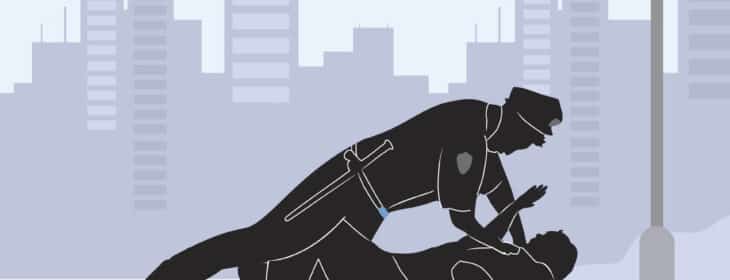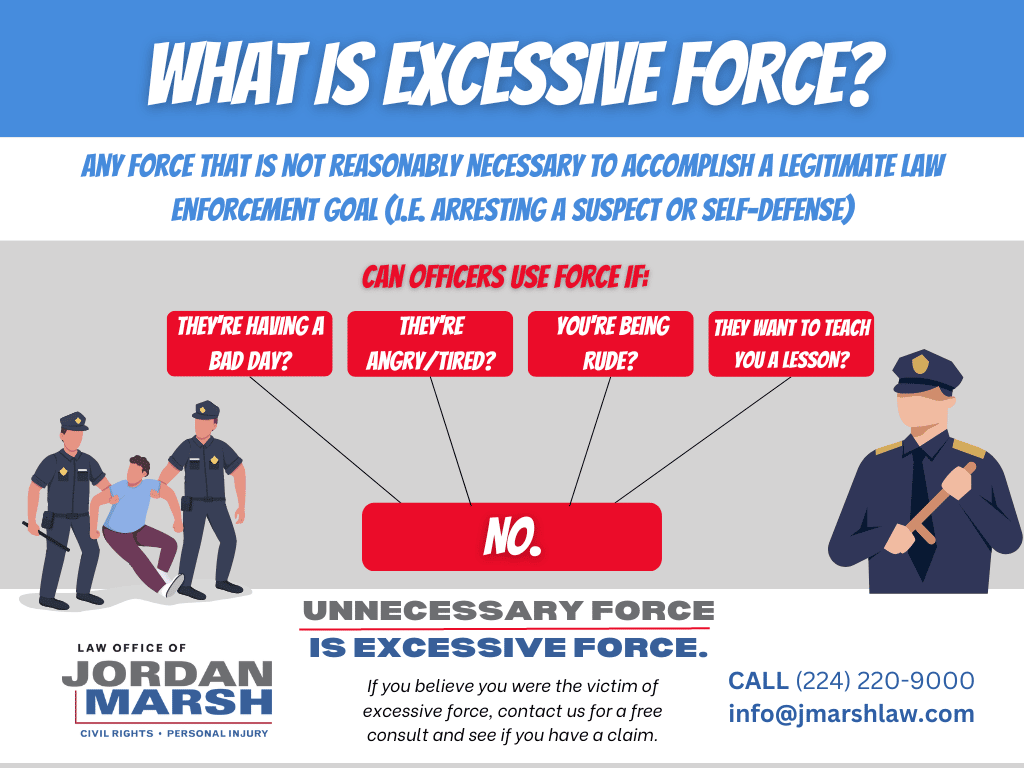
When it comes to interacting with law enforcement officers, many of us have experienced or heard about incidents where the police use excessive force. Whether it is being tased, punched, kicked, shot at with a gun, or tear-gassed by police officers – these are all forms of extreme actions that can lead to severe injuries and even death.
Regardless of the severity of the force used, any excessive force by a police officer violates an individual’s bodily autonomy guaranteed by the United States Constitution.
That’s why there’s no excuse for excessive force by police officers.
Thankfully, you have a constitutional right against the use of unreasonable force, and you have legal remedies in the event that the police do use it. Here’s what you need to know.

Excessive force is when a police officer uses more force than is reasonably necessary. The Fourth Amendment of the United States Constitution, as well as police department policies, protect citizens from excessive force by police.
In Chicago, the Chicago Police Use of Force Policies governs police conduct. Those policies emphasize “the difficulty of split-second officer decision-making” and state that standards are based on the behavior of a reasonable officer based on information possessed by the officer. The Chicago police code also outlines methods for de-escalating conflicts. These tactics ideally will limit police use of force in certain situations.
Any force used not only needs to be reasonable, but it needs to be reasonable in light of the circumstances. It must also be proportional to an apparent threat, including the threat of death or physical injury.
Excessive force can take a variety of forms, including:
The Fourth Amendment of the U.S. Constitution says:
“The right of the people to be secure in their persons, houses, papers, and effects, against unreasonable searches and seizures, shall not be violated, and no Warrants shall issue, but upon probable cause, supported by Oath or affirmation, and particularly describing the place to be searched, and the persons or things to be seized.“
Police force falls under the “searches and seizures” component of the Fourth Amendment. Specifically, police use of force on a civilian is considered a seizure.
Thus, any use of force must be reasonable. In other words, any use of force that is unreasonable is, by definition, excessive force aka Police Brutality.

How do we define unreasonable use of force? That largely depends on the situation as understood by the officer.
Here’s how the courts define it:
An officer’s use of force is unreasonable if, judging from the totality of the circumstances at the time of the arrest, the officer uses greater force than was reasonably necessary to effectuate the arrest…This constitutional inquiry is objective and does not take into account the motives or intent of the individual officers.
Phillips v. Cmty. Ins. Corp., 678 F.3d 513, 519-20 (7th Cir. 2012)
For example, tackling a cooperative suspect and using a taser on the suspect despite the suspect posing no threat or resistance would be unreasonable, and thus excessive.
Conversely, if the suspect actively resists arrest, struggles with the officer, and attempts to flee, that changes the analysis. Under those circumstances, tackling and tasing the suspect might very well be seen as justified and reasonable under the circumstances. This is one of several reasons why it’s never a good idea to resist arrest.
Remember, an officer’s job is to protect himself or herself and those around them. The officer may use force as reasonably necessary to ensure that everyone else stays safe, or that they’re able to arrest the suspect. Any threat to others or resistance to arrest may justify some use of force.
Avoid confrontational or aggressive behavior at all costs during a police encounter, as this may falsely be interpreted as a threat by officers and can lead to excessive force. Instead, calmly comply with instructions and maintain a polite demeanor even in difficult situations. Remember—comply first, complain later.
The short answer is absolutely not.
An officer may use deadly force when a reasonable officer, under the same circumstances, would believe that the suspect’s actions placed him or others in the immediate vicinity in imminent danger of death or serious bodily harm.
But an officer’s allowable use of force depends on the specific circumstances of each case. Think of it as a sliding scale: the greater the resistance, the more force would be reasonably necessary to make the arrest.
Similarly, if an apparently unarmed suspect takes a fighting stance with an officer — “puts his dukes up,” as they used to say — the officer may be allowed to tackle the suspect, otherwise known as a “takedown,” because the suspect has indicated he will resist the arrest by force.
Under the same circumstances, shooting the suspect who takes a fighting stance (still assuming the suspect appears unarmed) would plainly be excessive, as it is utterly disproportionate to the threat level.
You should never actively resist an officer. You should always make it as clear as possible that you’re not
Having said that, if you’re being violently assaulted, you have every right to defend yourself by attempting to ward off the punches, kicks, or moving away.
But the minute you start actively fighting back, things will get a lot worse for you.
Excessive force by police can have devastating physical repercussions for the people subjected to it. Common types of injuries can include:
If you think you have a potential claim against a police officer, you should never hesitate to reach out to a qualified civil rights attorney. An attorney will be able to help you develop a comprehensive legal strategy so that you can be compensated for any wrongful bodily injury, harm, and emotional distress you suffered.
You should speak to an attorney as soon as possible. Civil rights claims are subject to unforgiving time limits. If you don’t file in time, you may be barred from filing at all.
Jordan Marsh is an experienced attorney who specializes in civil rights issues. He has years of experience helping clients with their police brutality, deprivation of rights, and police misconduct claims.
Every person who suffers from excessive force by the police deserves protection under civil rights laws.
Police use of force cases can be tricky to navigate. However, with an experienced attorney on your team, you can receive maximum compensation for your mistreatment.
If you think you or someone you know may have been a victim of excessive force, false arrest, or any other civil rights violation, contact Chicago civil rights lawyer Jordan Marsh for a free consultation at (224) 220-9000 or at jordan@jmarshlaw.com. Let’s discuss your civil rights complaint and find out if you have an excessive force claim.